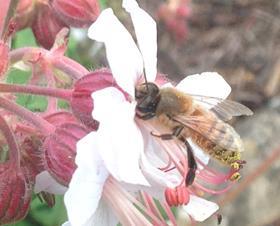
Flying robot bees could be used to pollinate crops in place of the real creatures, according to Japanese researchers.
A study, published in the Chem journal, used ionic liquid gels on small patches of hair to absorb pollen onto a remote-controlled ‘drone bee’.
The research was prompted by the global decline in pollinators, researchers said, and the “need to develop a pollination tool that does not require time and effort.”
The robot bees could pick up 41 per cent of the pollen available within three landings, and successfully pollinated the flower in 53 out of 100 attempts, according to the Independent newspaper.
Although the robots were manually operated in this study, researchers said that artificial intelligence and GPS could lead to the drones foraging and pollinating autonomously.
“Such materially engineered artificial plant pollinators should lead to the development of high-performance robotics that can help counter the decline in honeybee populations,” the study said.



